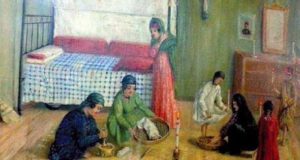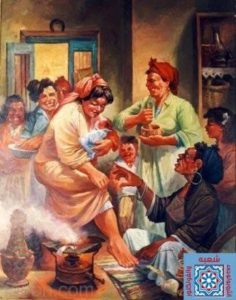Soboa, Baby shower
Seboua’ is a name given to the celebration of the seventh day of a child’s birth, in which some rituals and practices are carried out, most of which aim to protect the newborn, as protecting him from evil spirits that individuals believe in their presence and that they are close and can harm the individual in certain stages of his life when he is weak or while transition from stage to another. Preparation for the Soboua party begins after the child birth and check on the mother and the newborn. Preparation begins with buying supplies and collecting tools, either by purchasing or borrowing from relatives and neighbors. Traditionally, the midwife prepares for the ceremony and performs rituals after the birth process is completed. Among the changes that have affected the celebration of the Soboua is the disappearance of the midwife’s role, which no longer exists in many local communities, and the elderly women in the family have played the role of preparing for the Soboua and conducting the related belief rituals. The rite begins from the night before the seventh day of the child’s birth; By placing a knife under the pillow of the newborn, believing that it frightens the jinn and evil creatures that can come to harm him. A pottery vessel that differs according to the gender of the newborn, as it is a Qula for the female and a Jug for the male, put in a tray filled with water and 7 kinds of grains, and it is noted here that the number seven, around which many popular beliefs revolve, especially the protection rituals, of which the Sebou’ is one of them. Grains are associated with the symbolism of growth and prosperity that people wish for the newborn. Candles are lit and left until they expire or go out on their own/ The longest-lasting candle that goes out at last is given the name it bears, as they believe that this is a sign of a person’s longevity and a good omen. On this night, the women soak dried beans in water and leave it overnight until it softens, and on the next day they make small bracelets, each contains seven grains of beans, that are distributed to well-wishers and attendees as a gift from the newborn that is kept in the belief that it brings livelihood and wealth to the bearer. In the Sebou’ party, family, friends and neighbors are invited, give aways are prepared distributed to the attendees, which are usually bags of candy, popcorn and a candle. The children sing traditional songs in which they wish the newborn to grow up and become like them. The child is placed in a sieve and is shaken and the copper mortar beats, which is a copper vessel that induces a loud voice while repeating some commandments for the newborn, which they believe penetrate his hearing with the high copper sound. In-kind and cash gifts are presented to the mother in this celebration which called locally « Noquot » as a mandatory gifts.



